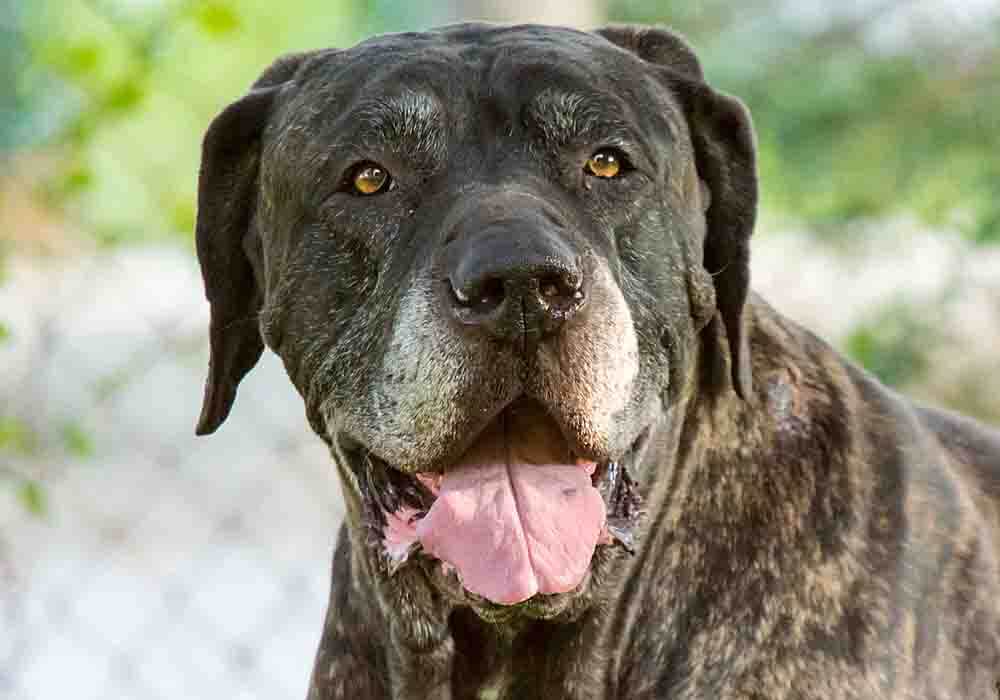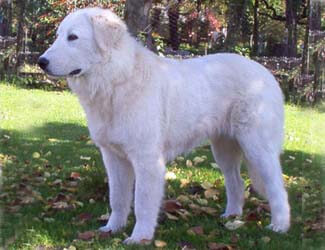Mastiff Dog Health
Problems and Concerns That Come With This Breed
by Ken Alden
When it comes to the Mastiff dog health problems and concerns that owners have about this breed there can be more than your average dog due to their size.
Mastiff Dog Health Problems And Concerns
Mastiffs are prone to several health problems, including bloat, hip dysplasia, eye problems, cancer, and allergies. Treating these ailments costs anywhere from $500 to $14,000, depending on the severity of the conditions and whether or not the Mastiff owners have health insurance for their pets.
This article will go over the most common health problems experienced by Mastiffs, the cost of treating these conditions, and some reasons why Mastiff owners may want to invest in dog health insurance. Read More Below...
Disclaimer: The writers of this page are not veterinarians. The information we provide should not be a substitute for veterinary medical advice. Pet owners should always consult with their vet if they have any pet-related questions or concerns.
Pro-tip: Ever try lifting a Mastiff? Their weight can hurt not only your back but their joints when they hop down from cars, sofas or even your bed. To protect your back and theirs check out the best Mastiff ramps on Amazon.com now.

Mastiffs and Bloat
Bloat is a condition in which dogs' stomachs fill up with gas, and then they twist. This twisting makes it so blood can't pass through their stomachs to get to their other organs. When blood can't get to the organs, they shut down, which can be fatal if not treated immediately. mastiff dog health problems and concerns
Bloat is common in large dog breeds with deep chests, especially Mastiffs.
Mastiff Bloat Symptoms
Bloat comes on very quickly. Owners need to be aware of bloat symptoms to get their mastiffs to the hospital as soon as possible.
Listed below are the most common symptoms of bloat:
- Pain in the stomach area when it is touched
- Dry heaving, but they are unable to throw up
- The stomach is hard and swollen
- Restlessness, panting, or obsessive drooling
If owners notice any of these symptoms, they should contact their vet right away and take their dog in for treatment. Waiting just a minute long can be fatal for dogs. They must get help right away.
Mastiff Bloat Surgery
Veterinarians can perform prophylactic gastropexy surgery on dogs that have a high probability of getting bloat. During this surgery, the vet pins the dogs' stomachs to their bodies' walls. This helps prevent their stomachs from twisting. While this surgery doesn't fully assure that the dogs will never experience bloat, it reduces their risk.
Read more about Mastiff bloat on this page of ours.
Pro-tip: Mastiff anxiety, aggression, destructive chewing, jumping up, fearfulness, and other behaviors can be controlled with the right training program.
Here’s a great course that
addresses these issues along with many other dog training basics: Check it out now!
Mastiff Hip Dysplasia
Hip dysplasia is a condition that has to do with the hip joint. In healthy dogs, the femur (thigh bone) fits perfectly inside the hip socket, resulting in a perfectly formed hip joint.
However, in dogs with hip dysplasia, the bones that make up the hip joint grow at different rates. This makes the bones not fit together properly, making the hip joint very loose. Because the joint is loose, the bones move around more than they should, which wears down the bones and causes pain for the dogs.
The body tries to correct for this looseness by tightening up the hip joint. This tightening often leads to osteoarthritis, a painful condition that causes the joints to harden up. mastiff dog health problems and concerns
This condition is common in large dog breeds, especially Mastiffs. It is hereditary, but it can be magnified in dogs with a poor diet or don't get enough exercise.
Mastiff Hip Dysplasia Symptoms
Some of the most common symptoms of hip dysplasia include:
- Lameness in the hind part of the body
- Stiffness or pain
- A smaller range of motion in the hip area
- Doing a strange "bunny hop" walk
- Hesitant to climb stairs, walk, get up, etc.
These symptoms will vary depending on the dogs' ages, how long they've had hip dysplasia, how loose their hip joints are, and the overall severity of the condition.
Mastiff Hip Dysplasia Treatment
Since hip dysplasia is hereditary, it is unpreventable. However, once dogs get this condition, there are several surgical treatment options available to them.
One treatment option is a Triple Pelvic Osteotomy (TPO). It is when the vet cuts the dog's pelvis in multiple places. This allows the femur to fit better inside the hip socket. Another option is a Femoral Head Osteotomy (FHO), during which the vet will remove the head of the femur so it can no longer rub against the joint and cause pain.
In more serious cases, dogs usually need a total hip replacement. This surgery is costly, ranging from $3,500 to $7,000 for one hip or $7,000 to $14,000 for two hips
Pro-tip: Mastiff's (and their owners) love dog crates…and for good reasons. Crates keep dogs from mischief while you're away, are perfect for house training, for traveling by car, and provide the dog a place to de-stress. Check out the best Mastiff crates on Amazon.com now.
Mastiff Eye Conditions and Problems
Mastiffs are prone to several eye conditions, including entropion, cataracts, and Progressive Retinal Atrophy (PRA).
Entropion
Entropion is a condition by which the eyelid goes in towards the eye. The eyelashes then rub against the outer part of the eye, which causes irritation and pain. If this condition isn't treated, it can lead to blindness.
Typically, entropion can be treated with surgery if it is caught early enough.
Cataracts
Cataracts are an inherited condition that results in cloudy spots forming over the lens of the eye. They range in size from small spots to large blotches. Cataracts that cover the entire eye result in blindness.
Older Mastiffs commonly experience cataracts. Depending on the dog, they can sometimes be removed through cataract surgery, during which the vet removes the dog's lens and replaces it with an artificial one that can't develop cataracts. This surgery costs anywhere from $2700 to $4000.
Progressive Retinal Atrophy (PRA)
PRA is an inherited disease that can lead to blindness. Dogs with PRA have a bad gene that makes them start going blind when they are three to five years old.
This disease is common in Mastiffs. Sadly, it isn't curable, so if a dog has PRA, they are stuck with it for life.
Mastiffs and Cancer
Cancer is prevalent in all dogs, including mastiffs. Some of the most common types of cancer include lymphoma, mast cell tumors, and osteosarcoma.
Osteosarcoma is a type of bone cancer that is very prevalent in large dog breeds, especially Mastiffs. It most commonly affects the wrists, knees, and shoulders. It causes dogs to experience lameness, swelling, and even death.
To treat osteosarcoma, veterinarians need to diagnose and exam the dog to determine the severity of cancer and its available treatment options. Then they'll typically perform surgery to remove any tumors in the bones and perform chemotherapy. This process is very expensive. On average, diagnosis costs between $800 to $1000, surgery from $1000 to $3000, and chemotherapy from $2000 to $4000.
Mastiff Cancer Symptoms
Some of the most common symptoms of cancer include:
- Unusual bumps on their skin
- Strange discharge from their mouth, ears, rectum, or eyes
- Changes in weight and appetite
- Wounds that won't heal
- Difficulty breathing
The signs of cancer are more difficult to identify in some dogs than in others. If pet owners ever notice that their dog is acting out of the ordinary, it's a good idea to contact the vet. Even seemingly harmless changes in appetite, mood, or other factors can signal that something is wrong.
Common Mastiff Allergies
Mastiffs can get allergies from fleas, what they eat, or the environment.
- Flea allergy dermatitis - Some dogs have allergy in flea saliva, so they have allergic reactions whenever fleas bite them. Flea allergies can make dogs' skin red and inflamed. It also makes them incredibly itchy.
- Food allergies - Some mastiffs have serious food allergies, resulting in skin problems, such as hives and intense itchiness, vomiting, and diarrhea. In severe cases, food allergies can lead to anaphylaxis, which causes their bodies to go into shock. Anaphylaxis is very dangerous and often fatal.
- Environmental allergies - Environmental allergies are often caused by pollen, dust, or mold. They are typically seasonal, so dogs may only experience them during certain times of the year. These kinds of allergies typically make dogs very itchy and uncomfortable, especially in their ears, muzzles, near their eyes, by their groin, and in between their toes.
Here's a very helpful article written by the AKC which delves further into dog allergies and the symptoms.
Health
Conditions
Bloat
Hip Dysplasia
Entropion
Cataracts
Progressive Retinal
Atrophy (PRA)
Cancer - Lymphoma
Cancer - Mast Cell Tumor
Cancer- Osteosarcoma
Allergies
Risk
(low, medium, high)
High
High
High
High in older dogs
High
Medium
Medium
High
Medium
Cost of Diagnosis/ Treatment
$1,500 to $7,500
$3500-$7000 one hip
$7000-$14000 two hips
$1100 to $1800
$2700 to $4000
Untreatable
$500 diagnosis
$1000-$3000 surgery
$4000-$10000 radiation
$500-$1000 cell removal
$4000-$10000 radiation
$800-$1000 diagnosis
$1000-$3000 surgery
$2000-$4000 chemo
$803 or more
Should I Consider Health Insurance for My Mastiff?
Mastiffs and other large dog breeds are more prone to serious health conditions than smaller dog breeds. So, it's an excellent idea for Mastiff owners to invest in dog health insurance. This will reduce the amount pet owners have to pay out of pocket for their vet to diagnose and treat these costly conditions.
Typically, pet health insurance costs between $30 to $50 per month. Paying this small fee each month will save owners money in the long run if their dog experiences a serious health condition. mastiff dog health problems and concerns
We reviewed the top 3 pet insurance carriers for the best deals and features, be sure to check out our article here.
Mastiff Dog Health Problems And Concerns...Final Thoughts
Mastiffs are prone to several serious health conditions, including bloat, hip dysplasia, eye problems, cancer, and allergies.
These conditions generally cost upwards of $500 to diagnosis and to treat, so it is recommended that Mastiff owners invest in health insurance. Health insurance provides owners with a way to take care of these magnificent dogs without going broke in the process.
I hope this article provides pet parents with all of the information they need to take great care of their Mastiffs!
Return to the top of this Mastiff Dog Health Problems And Concerns page

About the Author...
Ken Alden, a dedicated Mastiff owner for over eight years, is acclaimed for his expertise in care, grooming, and training. Read more About Me and my dog Shadow.
- Mastiff Guide Home ›
- Mastiff Care Information Guides ›
- Mastiff Health Problems And Concerns






